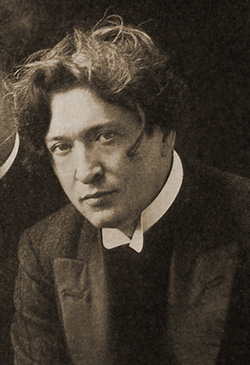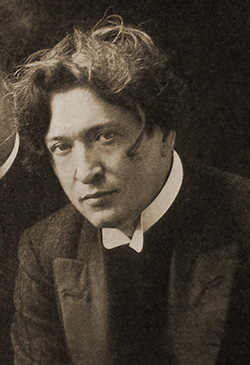Ferruccio Busoni
Ferruccio Busoni (1 April 1866 – 27 July 1924) was an Italian composer, pianist, conductor, editor, writer, and teacher. His international career and reputation led him to work closely with many of the leading musicians, artists and literary figures of his time, and he was a sought-after keyboard instructor and a teacher of composition.
See More :
Ferruccio Dante Michelangelo Benvenuto Busoni (1866-1924) was born in Empoli, near Florence, Italy.
He was taught by his parents, who were both professional musicians, and made a sensational public debut as a pianist at the age of seven. After holding teaching posts in Helsinki, Moscow and Boston, he settled permanently in Berlin at the age of 28, continuing to travel widely as a performer.

Busoni’s important achievements as a composer were long over-shadowed by the fact that he was generally thought the greatest piano virtuoso after Liszt.
He also made his mark as a respected teacher of both piano playing and composition, and as an editor of Bach’s keyboard music. His thoughts on Bach’s music have been highly influential, although his editions weren’t exactly what we today would call authentic. In spite of his interest in baroque and classical music, Busoni was certainly no backward-looking composer. In his writings he proposes the use of microtonal scales and electronics, and in 1912 he produced his first work “without tonality”, the Second Sonatina. Busoni’s major keyboard work, Contrapuntal Fantasy, is based on the final, incomplete fugue from Bach’s Art of Fugue. It was first published in 1910, and later revised several times.
His Piano Concerto is one of the longest ever written, at least seventy minutes in performance, and makes use of a male choir. This preference for writing long and difficult works has not made Busoni a favourite in concert halls, but through his teaching he influenced 20th century music greatly.
Among his pupils were Kurt Weill, Edgard Varèse and Stefan Wolpe; John Cage and Morton Feldman are among the later composers who have acknowledged his importance.
All pieces: |
||||
|---|---|---|---|---|
Six Pieces Op. 33 |
||||
| 1. Schwermut | N/A | 1896 | 8 | |
| 2. Frohsinn | D Minor | 1896 | 8 | |
| 3. Scherzino | C Major | 1896 | 7 | |
| 4. Fantasia in modo antico | B Minor | 1896 | 7 | |
| 5. Finnish Ballade | C Minor | 1896 | 7 | |
| 6. Exeunt omnes | B Major | 1896 | 7 | |
Elegies |
||||
| 1. Nach der Wendung | N/A | 1907 | 8+ | |
| 2. All’Italia! In modo napolitano | N/A | 1907 | 8+ | |
| 3. Meine Seele bangt und hofft zu Dir | N/A | 1907 | 8 | |
| 4. Turandots Frauengemach | N/A | 1907 | 8+ | |
| 5. Die Nächtlichen | N/A | 1907 | 8 | |
| 6. Ercheinung | N/A | 1907 | 8+ | |
| 7. Berceuse | N/A | 1907 | 8 | |
Indian Diary Book 1 |
||||
| Indian Diary 1 | N/A | 1915 | 7 | |
| Indian Diary 2 | N/A | 1915 | 8+ | |
| Indian Diary 3 | N/A | 1915 | 8+ | |
| Indian Diary 4 | N/A | 1915 | 8 | |
Sonatinas |
||||
| Sonatina 1 | N/A | 1910 | 8 | |
| Sonatina 2 | N/A | 1912 | 8+ | |
| Sonatina 3 | N/A | 1916 | 7 | |
| Sonatina 4 | N/A | 1917 | 7 | |
| Sonatina 5 | N/A | 1919 | 8 | |
| Sonatina 6 – Chamber Fantasy from the Opera Carmen by Bizet | N/A | 1920 | 8 | |
Transcriptions |
||||
| Bach: Chorale Prelude 1 – BWV 667 | C Major | 1909 | 8+ | |
| Bach: Chorale Prelude 2 – BWV 645 | E-flat Major | 1909 | 8+ | |
| Bach: Chorale Prelude 3 – BWV 659 | G Minor | 1909 | 8+ | |
| Bach: Chorale Prelude 4 – BWV 734 | G Major | 1909 | 8+ | |
| Bach: Chorale Prelude 5 – BWV 639 | F Minor | 1909 | 8+ | |
| Bach: Chorale Prelude 6 – BWV 617 | A Minor | 1909 | 8+ | |
| Bach: Chorale Prelude 7 – BWV 637 | A Minor | 1909 | 8+ | |
| Bach: Chorale Prelude 8 – BWV 705 | D Minor | 1909 | 8+ | |
| Bach: Chorale Prelude 9 – BWV 615 | G Major | 1909 | 8+ | |
| Bach: Chorale Prelude 10 – BWV 665 | E Minor | 1909 | 8+ | |
| Bach: Prelude & Fugue for Organ – BWV 532 | D Major | 1888 | 8+ | |
| Bach: Prelude & Fugue for Organ – BWV 552 | E-flat Major | 1890 | 8+ | |
| Bach: Toccata for Organ – BWV 564 | C Major | 1900 | 8+ | |
| Bach: Toccata and Fugue for Organ – BWV 565 | D Minor | 1900 | 8+ | |
| Bach: Chaconne for Violin – BWV 1004 | D Minor | 1897 | 8+ | |
Miscellaneous pieces |
||||
| Fantasy after J. S. Bach | F Minor | 1909 | 8+ | |
| Contrapuntal Fantasy | N/A | 1912 | 8+ | |
Copy by: pianosintheparks.com




Leave a Reply
Want to join the discussion?Feel free to contribute!